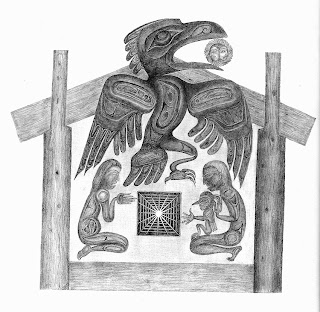 |
| The Raven Steals the Light: Bill Reid |
This book tells the story of the people who lived off the Pacific coast of what is now British Columbia and Alaska, on the distant islands known as the Haida Gwaii - now inappropriately re-named ‘Queen Charlotte Islands’. The Haida Indians had a very specific culture and a unique language - a click language not related to other Nth American first nation languages, hinting at different origins. The Haida lived in wooden ‘clan’ houses around the bays and inlets of the islands. Each house had an elaborately carved pole outside that told the story of the clan. It was both an address and a family history.
They were hunter gatherers, living off fish and berries, whales, birds, bears and anything they could catch. They valued art and story-telling (in poetry form) very highly. Every family had two sides - Raven side and Eagle side - and these two birds played a big part in their mythology, particularly the Raven - a trickster and shape shifter - who is at the heart of their creation myths.
With the arrival of western missionaries, in the late 19th century, the Haida culture was almost completely wiped out. In some villages more than 80% of the population died from imported diseases such as small pox, and their lifestyle was no longer viable. They went to work in factories and sawmills, and were given European names. More than a thousand years of art and literature was lost.
In 1901 an anthropologist went to stay there, learned their language and set out to record, word by word, some of their most important poetry from the elderly story-tellers who had survived. He transcribed hundreds and hundreds of pages - only about 1% of which was published at the time. And the original language texts of the poets and storytellers of the Haida Gwaii have lain unread ever since - perhaps because of their difficulty. Transcripts look like this (I’ve taken out all the glottal stops!):
Nang Kilstlas nagha ghahaw Tadl tsigha’awaaghan.
Sing qqalghada ll qaaxuhls
gyaan ll kindagaangas
sta lla xitkkudahldattsasi
This translates:
‘Loon was living in Voicehandler’s house.
She left the house at daybreak
and repeatedly she called.
Then she flew back in’
The poetry reflects the Haida beliefs that certain beings were able to shape shift between the three elements of water, earth and sky. Loon is a bird, but she’s living like a human being in a house - and in some stories Voicehandler’s house is at the bottom of the sea.
Scholar and poet Robert Bringhurst discovered the texts and has spent a large part of his life translating them into English, trying to keep their poetic form. This book offers some of them, with an account of the lives of the story-tellers and their lost culture. It’s a mixture of anthropology, poetry, history and biography. But at the heart of the book is a discussion about story-telling itself. ‘A story is not a solid object or a solitary entity but a transformative relationship.’
Very little in these tales is familiar to us - and not just what is in them, but also the way they are told. Why, Bringhurst asks, should we set the standards of what poetry is by using a system that originated in the east (originally Greek) - rhythm and rhyme. Why not a system just as ancient, but from a different part of the world - the patterning of ideas, thoughts, and events? The Haida had a system of 10 - objects, occurrences, themes, were grouped to add up to 10. Some of their stories are structured like two five-fingered hands.
Robert Bringhurst also offers some thoughts on the progression from oral story-telling to the written word. We think of reading as a modern thing -a product of civilisation, without ever thinking of the nature of reading itself; that words are simply another kind of human paw print to be read and interpreted by the tribe.
‘Reading, like speech, is an ancient, preliterate craft. We read the tracks and scat of animals, the depth and lustre of their coats ... We read the horns of sheep, the teeth of horses. We read the weights and measures of the wind, the flight of birds, the surface of the sea, snow, fossils, broken rocks ..... We also read, of course, the voices that we hear. We read the speech of jays, ravens, hawks, frogs, wolves, and , in infinite detail, the voices, faces, gestures, coughs and postures of other human beings. This is a serious kind of reading, and it antedates all but the earliest, most involuntary form of writing, which is the leaving of prints and traces, the making of tracks.’
I was interested to hear Haida spoken - there are only a handful of elderly Haida still alive who spoke the language as children. There's a video on YouTube 'The Surviving Sounds of Haida Gwaii'
The book filled me with sadness for the rapaciousness of our culture, which has wiped so many ancient cultures off the face of the earth, leaving only fragments. Language, which seems the least durable, has in the end proved more lasting than some of the solid objects the Haida made.
Bringhurst sums up:
‘language is a vehicle of knowledge and a key to the interlocking prisons of society and time. When it’s written down, it can let me hear from people who knew things I don’t know and saw things I can’t see because they lived in another time, in another world. Nothing language does seems more wonderful to me than that.’
Artwork by Bill Reid 1920-1998 from ‘The Raven Steals the Light’
© the Bill Reid Foundation
For more images visit http://theravenscall.ca/










